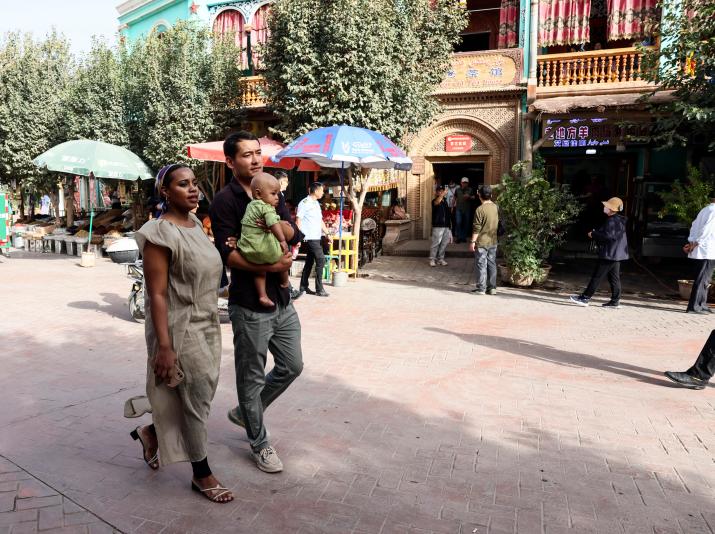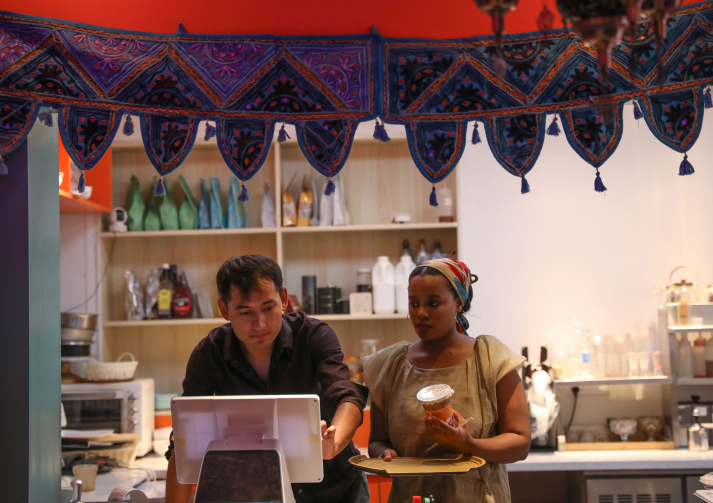| Xinjiang Today |
| A sip of love | |
|
|
 Hadiya Msham Abdulla and her husband Dilxat Tursun stroll down a Kashi alley with their son on September 7, 2023 (XINHUA)
In the old town of Kashi (Kashgar), a city in south Xinjiang, where the time-honored architecture meets the modern world, a unique café stands out among the vibrant bazaar scenery. Owned by Hadiya Msham Abdulla from Zanzibar, Tanzania, and her husband Dilxat Tursun, a Kashi local, this café is not just a business; it's a testament to love, dreams and cultural fusion. Walking out of the Dili & Diya Café in her signature purple floral dress, Hadiya radiates confidence and warmth. With a smile that can light up the Kashi skies, she often breaks into song, singing traditional Tanzanian melodies that resonate with her roots, impressing customers and passersby. "I love Kashi and I'm very satisfied with my life now," she told Xinjiang Today.  The couple works at their café in September 2023 (XINHUA)
A café of memories The couple met in 2013 in Fuzhou, Fujian Province in southeast China, while Dilxat was pursuing his undergraduate degree in administrative management at Fuzhou University. Hadiya was an international student studying medicine at Fujian Medical University. The two campuses are adjacent, separated only by a road, creating a shared social scene that includes a restaurant specializing in Xinjiang cuisine. As regulars at this restaurant, it was only a matter of time before their paths crossed. Their connection was instant, leading to a beautiful love story that blossomed over the years. After a long-distance relationship, they married in 2020 and welcomed a delightful son into their family. However, the couple soon found themselves yearning for something beyond the confines of traditional careers. "Owning our own café was a shared dream," Hadiya explained. "We wanted to work together as a family." Their dream took flight in 2022 when they opened their café, seamlessly blending Chinese and Tanzanian influences in the heart of Kashi's old town. Despite its modest size, the café is filled with the couple's cherished memories. The aroma of coffee wafts through the air, inviting customers to experience a taste of both Kashi and Tanzania. The coffee beans are sourced from Tanzania, while the milk comes from local Kashi producers. "We blend two cultures here," Hadiya confidently said. "You won't find this taste anywhere else." Hadiya and Dilxat have also returned to Tanzania to explore coffee bean cultivation and processing, passionately promoting the charms of Kashi to their friends and family there. Hadiya said when they first opened the café, business wasn't booming because most locals preferred tea and yogurt. However, after roughly three months, they began to see a change, with many people starting to choose coffee. "Out of curiosity, many families would come in to try our coffee and experience the unique blend of Tanzanian and Chinese flavors in each cup," Hadiya said. "Some parents brought their kids to chat with me in English, which left a strong impression on me." Busy bees The café opens at 11 a.m. and closes at 11 p.m., seven days a week. During peak tourist seasons, it sells hundreds of cups a day. Dilxat said he and his wife have been extremely busy since the opening. "But even though it is physically demanding, it's also fulfilling," he said. During peak tourist seasons, the daily visitor count in Kashi's old town reaches over 50,000. "We attract many tourists, both national and international," Hadiya said. "What draws national tourists is the fusion of two cultures that we offer in our environment, our products and the family-friendly atmosphere. They enjoy communicating with us while sipping a cup of coffee." Over time, the café has gradually become a trendy attraction in Kashi's old town, frequently featured on various social media platforms and travel websites. The couple's own page on Douyin, the Chinese version of TikTok, features their daily life, tourism in Kashi, Silk Road journeys and stories from Africa. It currently has over 860,000 followers, who often express their admiration for their love story and entrepreneurial journey, as well as sending their blessings. Hadiya noted that the continuously improving infrastructure in Kashi's old town has created a sound environment for both living and doing business. With a history spanning over 2,000 years, the town is now home to more than 200,000 residents. Since 2010, renovations costing 7 billion yuan ($958 million) have revitalized the dilapidated houses, making them earthquake-resistant while preserving their traditional style. "Recent years have seen rapid development in Kashi. The old town is a scenic spot with huge potential. I'm very optimistic about it," Dilxat said. According to official statistics, in 2024, Kashi Prefecture, which administers Kashi City, received a total of 41.98 million visitors, representing a year-on-year increase of 26.36 percent. The prefecture achieved tourism revenue of over 35 billion yuan ($4.8 billion), a 31.24-percent increase compared to the previous year. Dilxat believes that the business opportunities in Kashi extend far beyond the increasing number of tourists. The city's inherent advantages in foreign trade, transportation and cultural exchange deserve more attention. He acknowledged that the biggest development bottleneck for his café is logistics. Air freight is fast but expensive, while sea freight is relatively cheap but time-consuming. However, these challenges have made Dilxat realize that the importance of the Belt and Road Initiative, a China-proposed initiative to boost connectivity along and beyond the ancient Silk Road routes. He is particularly focused on the China-Europe Railway Express, a freight rail network connecting China and Europe. "Coffee beans arrive in Europe by water, are transported to Urumqi (capital of Xinjiang) via the China-Europe Railway Express and then delivered to Kashi by courier, taking only about two weeks in total, with relatively low shipping costs," he explained. Speaking about future plans, Dilxat and Hadiya hope to open more outlets and launch an online store to sell delicacies from Kashi and Tanzania. "There's a century-old teahouse in Kashi. I hope that in the future the city will have a century-old café—our café," Dilxat said. Another home Hadiya shared that before coming to China, she had never heard of Xinjiang. It wasn't until she arrived in 2012 that she discovered the many different ethnic minorities in China besides the Han people. She had traveled to several cities in Xinjiang, all impressing her with their diversity, cultural richness and openness. "For example, Urumqi is very developed with high-rise buildings and busy streets, while cities like Kashi are less developed, but more traditional, cultural and colorful," Hadiya said. Hadiya added that Xinjiang culture has many similarities with Tanzanian culture specifically when it comes to the traditional clothing, music and food. "Xinjiang reminds me of my people. They are warmhearted and extremely welcoming. Even though it's far from my hometown, I feel comfortable and safe here," she said. Comments to luyan@cicgamericas.com |
|
||||||||||||||||||||||||||||
|